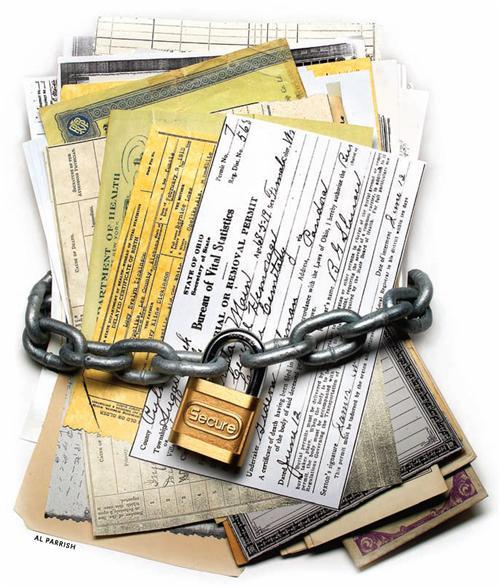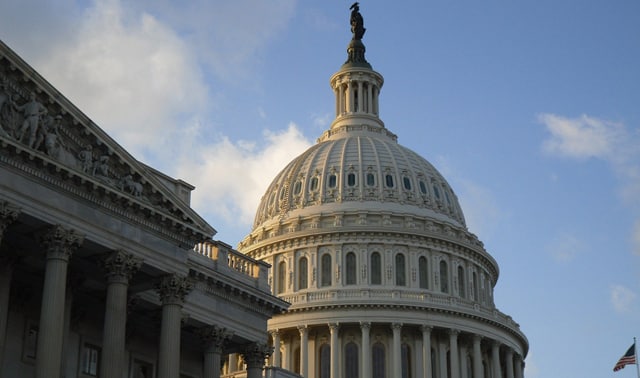Sign up for the Family Tree Newsletter Plus, you’ll receive our 10 Essential Genealogy Research Forms PDF as a special thank you!
Get Your Free Genealogy Forms
"*" indicates required fields

Generally, state “sunshine laws” require public records be available upon request for reasonable fees. But increasingly, state legislatures — including Colorado’s — make exceptions that let them raise fees and limit access to the vital records genealogists seek. According to an Associated Press survey last March, states have passed 616 laws restricting access to records, meetings and other public information since Sept. 11, 2001 — compared to 284 laws expanding access. It’s up to genealogists to take action.
Security measures
Colorado Sen. Jim Isgar sponsored HB 1357 to combat identity theft. The 2005 Javelin Identity Fraud Survey Report, however, found no cases of theft involving public records; most resulted from stolen wallets and checkbooks. Employee theft of customer data is another common culprit, Michigan State University professor Judith Collins found in a 2004 analysis.
But it does happen, counters Jay Foley, director of the Identity Theft Resource Center <www.idtheftcenter.org>. He cites criminals’ recent use of San Diego County real estate and death records (albeit recent ones) to defraud several individuals.
The Sept. 11, 2001, terrorist attacks — whose perpetrators boarded their planes under their real names, but had previously committed document fraud — linked public records with national security in American minds. State laws must now comply with the federal government’s sweeping Intelligence Reform and Terrorism Prevention Act of 2004, which in effect bars most public access to birth and death certificates for 70 to 100 years. A Congressional Research Service report notes, “Concern has been expressed that this provision may have an impact on genealogical and other historical research involving access to birth records … what exactly that impact will be appears dependent on precisely how the regulation is drafted.”
The law lets states make (or not make) exceptions for genealogists. But security and family history don’t have to be at odds: The report further notes, “It appears possible to draft a regulation that both complies with the statute and provides an exception for genealogical and historical access.”
Even when laws are on researchers’ side, clerks who handle requests may not know it. Last winter, the citizens group Californians Aware <www.calaware.org> requested public records from 31 state agencies, and none complied exactly as the law required. Many ignored their obligations altogether.
Keeping watch
Studies such as the Javelin report suggest laws might be more effectively aimed at businesses and agencies that gather your information. Data thieves have breached computer systems at corporations such as the background check firm ChoicePoint and DSW shoe stores. Last May, a government employee took home 26.5 million veterans’ personal data on a laptop — which was later stolen from his home.
Foley, who says “the key isn’t the record, but the amount of information in it,” favors redaction — obscuring Social Security and drivers license numbers before making records available. He encourages genealogists to avoid posting online Social Security numbers of living and recently deceased people. “Just because someone is dead doesn’t mean his credit history stops.”
Researchers should stay informed about state sunshine laws and bring a copy to the county courthouse (but to avoid rankling the clerk, don’t pull it out unless you have to). To counter measures such as Colorado’s HB 1357, genealogists must be vigilant about bills meandering through state legislatures. “We were at a disadvantage because we didn’t learn about the bill until it had already passed the House,” Miller says. “Coming into the game that late, the amendments were the best we could have hoped for.” She posts on CoGenBlog <cogenblog.com> to update researchers on records news; check with your state’s USGenWeb <usgenweb.org> project or genealogical society for local information.
Can’t find any? Use the resources above to visit your state legislature Web site, or contact the Federation of Genealogical Societies-National Genealogical Society (FGS-NGS) Records Preservation and Access Committee about being a state coordinator. Then pick up a pen and tell your elected representative where you stand.
Ever Vigilant
Use these resources to stay on top of laws that impact genealogists in your state:
• Congress.org: State Elected Officials
< www.congress.org/congressorg/dbq/officials>
• FGS-NGS Committee on Records Preservation and Access
< fgs.org/rpa>
• Project Vote Smart State Resources
< www.vote-smart.org/mystate_government_resources.php>
• Sunshine Week: Your Right to Know
From the December 2006 issue of Family Tree Magazine.
ADVERTISEMENT




